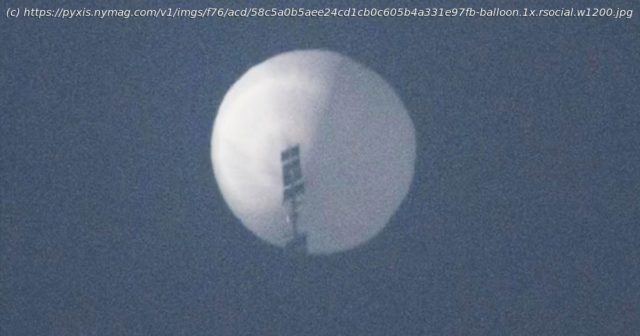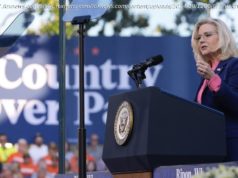Foreign-policy expert Robert Daly on how episodes like the spy balloon could lead to a new Cold War between the U.S. and China.
Relations between the U.S. and China were already at a nadir before American fighter jets shot down a Chinese spy balloon that had meandered across the Lower 48 earlier this month. (Since then, the U.S. has taken down three other objects, two over American airspace and one over Canada, all unidentified.) In Washington, there’s a growing bipartisan consensus that China is an international menace to the rest of the world, from its trade practices to its crackdowns in Hong Kong to its aggressive stance toward Taiwan. China, for its part, believes that American arrogance is unfairly constraining its rightful enshrinement as a superpower. With this level of bad blood, some experts worry about a cycle of unchecked escalation. One of them is Robert Daly, the Director of the Wilson Center’s Kissinger Institute on China. Daly is a former U.S. diplomat in Beijing, has acted as a Chinese interpreter for high-level statesmen including Jimmy Carter, and produced a Chinese-language version of Sesame Street. I spoke with him about why we’re in a new Cold War, and what the U.S. misunderstands about China’s global ambitions.
The U.S. believes that the balloon it shot down last week is part of a larger surveillance fleet that patrols countries around the world, from Asia to South America. What does it say about China’s leadership that it would use such a brazen and obvious method to spy on adversaries?
The United States has made clear that even before the balloon was shot down, we did fly-bys with surveillance planes, which were able to get a really good look at the array that hung below that balloon. Based on the solar cells they saw there and the equipment, they’re quite certain of the kinds of collection capacity this balloon has, and that it’s not just meteorological. Presumably, as we analyze the stuff we’ve hauled out of the Atlantic Ocean, that will be affirmed. And not only are we saying that China has this spy-balloon capacity, we’re briefing other countries extensively about it. We want to make sure that those countries are warned, but also that China is thickly tarred with this brush. This comes at a very good time for the United States because it helps to reaffirm and to lend real credence to our domestic narrative and our international narrative that China is a bad player, an authoritarian state.
So why would China be so brazen? There are a couple of reasons. One is that we’re pretty brazen. China sees us interfering in internal affairs around the world, carrying out influence operations — there was the hacking revealed in the Snowden files, which to some degree was forgotten here in the United States because we get bored with news and move past it. It’s not forgotten in the rest of the world. It’s a bomb that continues to go off, which for much of the world, and certainly for those who oppose us at all, means that we never have the moral high ground in this particular department. This balloon, which we’ve said really can’t collect anything new, is a fleabite compared to what Snowden revealed we were doing. And that was a long time ago; presumably we’ve done more since. So America as a superpower has been quite brazen, and it has paid very little cost for that. Now it’s China’s turn. It’s part of that club, and it’s going to collect what it thinks it needs to collect in its own righteous self-interest. We don’t go around the globe apologetically explaining why we’ve been surveilling other countries, and we shouldn’t expect China to either.
So this is just another sign that China has joined the superpower club.
Yeah. One of the macro-narratives is that China is learning to be a superpower, and it has the power, but it’s really not so super at using it. It tends to be clubfooted and to make big, avoidable mistakes. And it’s trying to be a global superpower that does interfere in the internal affairs of other countries and does influence the global system, while still clinging to its old catechism that “we are but a poor developing country, and we never interfere in other nations’ affairs, and we are only about development, not spreading an ideology.” Its people have been raised on that, on the notion that China is always the victim, and it hasn’t figured out how to reconcile that very deeply rooted set of views with what China is in fact doing all around the world.
China loves to say it doesn’t interfere. What it can’t understand or accept is that development is interference — development of the sort they’re providing through their Belt and Road initiative. It involves elite capture, picking winners. It involves, in many cases, bribes to supporting parties and uprooting Indigenous peoples. It threatens traditions, it changes societies. China is allergic to the notion that there may be moral difficulty with any of its actions as a superpower. So they’re going from deep, deep victim culture to victor mentality, and they’re trying both simultaneously right now, which is why you sometimes see them staggering in their public relations, as with the spy-balloon incident.
Some people have proclaimed that the U.S. and China are now in a Cold War, or that they have been for some time. Is this a useful framework?
It is a Cold War, but it’s not the Cold War. There are a number of major differences. A lot of Americans reject the Cold War analogy, for, I think, three reasons. One is that during the first Cold War, the Soviet Union was not a comprehensive power, not a pure competitor of the United States. It was just a military power.






